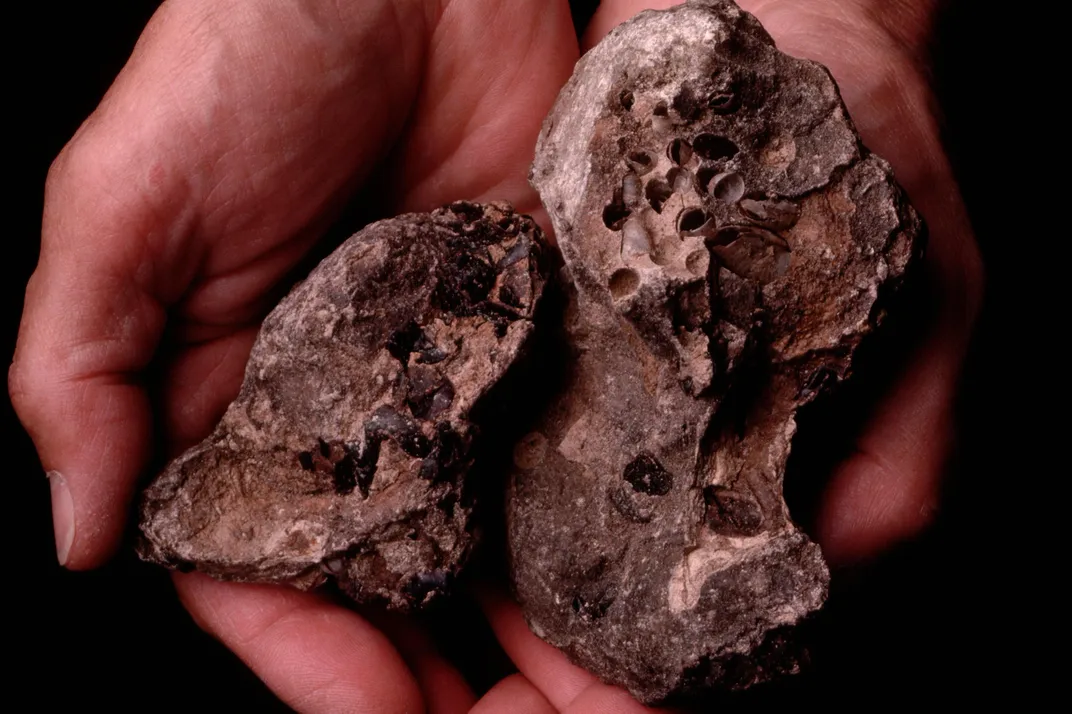Your High-End Perfume Is Likely Part Whale Mucus
A single pound of “whale vomit” can be worth tens of thousands of dollars
/https://tf-cmsv2-smithsonianmag-media.s3.amazonaws.com/filer/6b/37/6b37f841-c685-4fca-a8b2-317752297c8e/sperm_whale.jpg)
Last Sunday, Gary and Angela Williams were walking along Middleton Sands beach just outside Lancaster, England, when they caught a whiff of rotting fish. Instead of just moving along, the couple tracked down the smell, finding a large dirty-white lump on the sand. They knew what it was right away: a chunk of ambergris.
Also known as “whale vomit,” the putrid substance is produced by sperm whales, Physeter macrocephalus, and has been prized for centuries, still commanding big money from perfume makers. The couple wrapped the chunk of ambergris in a scarf and took it home. They are now consulting with experts about selling the 3.5-pound lump.
“It’s [got] a very distinctive smell, like a cross between squid and farmyard manure,” Gary told The Daily Mirror. “It feels like a rock hard rubber ball. Its texture is like wax, like a candle. When you touch it you get wax sticking to your fingers.”
They are not the first to win the ambergris lottery. In 2012, an eight-year-old boy found a 1.3 pound chunk of the stuff on a beach in Dorset, England, estimated at 60,000 dollars. In 2006, a couple in Australia discovered a 32-pound ambergris boulder, valued at 295,000 dollars. Beachcombers around the world collect much smaller clots of the stuff all the time, and sell it to ambergris brokers in New Zealand and Europe.
So what exactly is ambergris, and why is it so valuable? Scientist still aren’t sure about all the specifics, but they believe ambergris is formed in the intestinal tract of male sperm whales, writes Cynthia Graber at Scientific American. Because some of the whales’ favorite snacks are squid and cuttlefish, which have hard, sharp beaks, it’s thought that their intestines secrete a protective, fatty substance around the beaks to keep them from injuring their guts and organs.
Eventually, the whale evacuates the beak-filled glob, though since researchers haven't yet seen it happen they still aren’t sure which end of the whale it comes out. Sperm whale expert Hal Whitehead of Dalhousie University tells Graber he suspects the substance is defecated. “Well, it smells more like the back end than the front end,” he says.

When it’s first released, ambergris is a mass of black greasy chunks that float on the ocean surface. Over time it congeals and becomes gray and waxy. The longer ambergris floats at sea exposed to the sun and salt water, the more it develops “sweet, earthy aromas, likened to tobacco, pine, or mulch,” according to Graber. Eventually the lumps wash ashore.
That scent is probably what led people in the Middle East to use it to spice their food and as medicine centuries ago. It also led ancient Egyptians to burn it as incense and the Chinese to call it “dragon spittle fragrance.” Eventually, the potent lumps made their way into the European perfume industry where it is still used today, Graber reports.
According to Johanna Rizzo at National Geographic, the substance’s value to high-end perfumeries depends on its age and the scents it has developed. George Preti of the Monell Chemical Senses Center in Philadelphia tells Graber that a chemical component called ambrein gives ambergris a unique smell, like salt enriches taste. It also helps affix the perfume to the skin.
Ambergris’ advocates love the stuff. “It’s beyond comprehension how beautiful it is,” Mandy Aftel of Berkeley, California’s Aftelier Perfumes tells Eric Spitznagel at Bloomberg Businessweek. “It’s transformative. There’s a shimmering quality to it. It reflects light with its smell. It’s like an olfactory gemstone.”
But it is not without controversy. Because it comes from sperm whales, which are listed under the U.S. endangered species act and the Convention on International Trade in Endangered Species of Wild Fauna and Flora, ambergris is technically illegal in the U.S. and its use is questionable in other parts of the world, Spitznagel reports. However, no authority actively polices the sale of ambergris and it has shown up recently in cocktails and even sprinkled on mince pie.
Christopher Kemp, author of Floating Gold: A Natural (and Unnatural) History of Ambergris tells Spitznagel that there’s a thriving clandestine trade in the stuff, similar to truffle hunting. “If you believe what you read in the media,” he says, “you’d think ambergris is something that people just find by accident. There’s a whole underground network of full-time collectors and dealers trying to make their fortune in ambergris. They know the beaches and the precise weather conditions necessary for ambergris to wash up on the shore.”
In fact, he says the search for ambergris sometimes turns violent. Kemp points to one case where an ambergris hunter ran over his rival on the beach, who then fought back using a PVC pipe.
The scarcity of ambergris and its varying quality is one reason researchers have searched for an alternative to the stuff. According to Hadley Meares at Atlas Obscura, since the 1940s chemists have synthesized compounds like ambrox and cetalox that mimic notes in ambergris. In 2012, researchers at the University of British Columbia identified a gene in balsam fir trees that makes a compound that smells close to ambergris. Still, many people think synthetics have nothing on natural ambergris, and it's rumored many more perfume houses use the product than like to admit.
“It’s like watching a Beatles cover band instead of the real thing,” Christopher Kemp tells Meares. “It gets close but lacks something indefinably important. There’s a part of my reptile brain that isn’t convinced by it.”
That’s why Gary and Angela Williams are hoping a chunk of whale mucus will still fetch them thousands of dollars. “If it is worth a lot of money, it will go a long way towards buying us a static caravan [mobile home],” Gary tells The Mirror. “It would be a dream come true.”